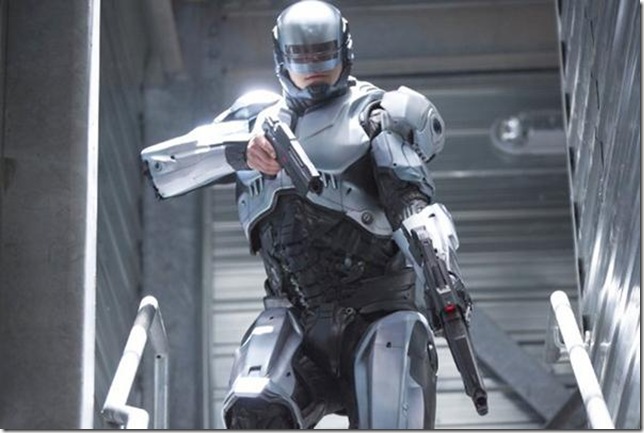If you’re looking for reasons to hate on director Jose Padilha’s RoboCop remake, I’m sure you can find them.
It has its requisite number of head-shaking action-movie contrivances, where the bad guy can easily exterminate the good guy if he wouldn’t stop blabbering, and just as he’s finally about to pull the trigger, a second good guy materializes out of the ether to plant a bullet in the bad guy. To expect no scenes like this in a Hollywood action movie is to expect a Hitchcock film without a persecuted blonde.
You may also grumble that most everything about this RoboCop is fairly on the nose: The chief villain’s name is Vallon (Patrick Garrow), a humorless, perpetually unshaven subterranean drug lord who, with the sort of mug he was given, can really only be a ruthless drug lord. Ditto the actors who snap like widgets down a factory line into their proscribed objects: Michael Keaton plays the also aptly named Raymond Sellars, the avaricious CEO of OmniCorp, the defense contractor that brings the RoboCop to fruition. And Gary Oldman, who to his credit seems to be unrecognizable in just about every role he accepts, plays Dennett Norton, the saintly robotics doctor whose ethical nobility is put to the test when he is assigned to turn the RoboCop into a military asset.
These characters aren’t new, but none of their familiarity disqualifies this tonally correct remake from being great, subversive fun. Remember that Paul Verhoeven, who directed the original 1987 cult classic, is not a filmmaker known for his subtlety, and Padilha films his reboot with a similar sense of in-your-face directness. Feast your eyes on the moment when RoboCop prototype Alex Murphy (Joel Kinnaman) — who barely survives a car bomb before being retrofitted with cyborg parts — asks Dr. Norton to remove his artificial suit. The result is a marvelously realized head, lungs and single hand connected by wires, a macabre shot that conjures B-horror films like The Brain that Couldn’t Die more than anything on a mainstream movie screen.
Murphy’s RoboCop is meant to encapsulate the best of two worlds, a chimera with the efficiency of a machine and the soul of a human, whose humanness can be shut off with the flip of a switch or a reduction in dopamine levels whenever he decides to stray off the reservation. While Verhoeven and his screenwriter, Edward Neumeier, aimed their original RoboCop satire on the issues plaguing American industry at the turn of the 1980s — like the abandonment of Rust Belt-style factories — Padilha and his screenwriter, Joshua Zetumer, update their futuristic parable on the precipice of the Singularity, with the inevitability of synthetic “humanity” growing more plausible with every passing decade.
In a mass surveillance state in which robot drones are such an everyday reality that their existence is no longer controversial, the movie’s legislative debates about the moral hazards of fully automated cyborg cops seem like a small hurdle for technology to jump. (Naturally, this American-bred idea is refined in China.)
Initially, this remake seems calculated to appease both the right and left; the former, with its depictions of vigilante justice from its metallic Dirty Harry, and the latter, with its visions of corporate greed, overreach and corruption. It ultimately finds a political center of bipartisan libertarianism, if such a thing exists — Murphy symbolizes defiant liberation from the chokehold of governments and corporations alike.
Then as now, RoboCop works as well as it does because its necessary chunky action scenes are at the service of its politics, not the other way around. Perhaps the reason both films’ satires on American culture and capitalism are so lucid and effective is because they’re both made by directors of foreign nationalities — outsiders looking in. Hailing from Brazil, Padilha rose to international acclaim with the docudrama Bus 174, and his foregrounding of the issues at the expense of Hollywood’s typical litany of action sequences sets his vision apart.
Perhaps Padilha’s sharpest, and certainly his wittiest, critique, is saved for his depiction of cable-news punditry in the not so distant future. Fancy Star Wars-style holograms have replaced traditional talking-head technology, but the propagandists are the same; The O’Reilly Factor has paved the way for “The Novak Element,” with Samuel L. Jackson as the titular, flag pin-wearing, Praise America Firster bloviating into a camera. The actor saves the film’s funniest surprise for its denouement. Can anybody say, “spinoff?”
ROBOCOP; Director: Jose Padilha; Cast: Joel Kinnaman, Gary Oldman, Michael Keaton, Abbie Cornish, Jackie Earl Haley, Jay Baruchel, Samuel L. Jackson; Distributor: Sony Pictures Entertainment; Rating: PG-13; Opens: Friday, wide
